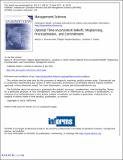Optimal Time-Inconsistent Beliefs: Misplanning, Procrastination, and Commitment
Author(s)
Brunnermeier, Markus K.; Papakonstantinou, Filippos; Parker, Jonathan A.
DownloadOptimal time.pdf (437.8Kb)
MIT_AMENDMENT
MIT Amendment
Article is made available in accordance with the publisher's policy and may be subject to US copyright law. Please refer to the publisher's site for terms of use.
Terms of use
Metadata
Show full item recordAbstract
We develop a structural theory of beliefs and behavior that relaxes the assumption of time consistency in beliefs. Our theory is based on the trade-off between optimism, which raises anticipatory utility, and objectivity, which promotes efficient actions. We present it in the context of allocating work on a project over time, develop testable implications to contrast it with models assuming time-inconsistent preferences, and compare its predictions to existing evidence on behavior and beliefs. Our predictions are that (i) optimal beliefs are optimistic and time inconsistent; (ii) people optimally exhibit the planning fallacy; (iii) incentives for rapid task completion make beliefs more optimistic and worsen work smoothing, whereas incentives for accurate duration prediction make beliefs less optimistic and improve work smoothing; (iv) without a commitment device, beliefs become less optimistic over time; and (v) in the presence of a commitment device, beliefs may become more optimistic over time, and people optimally exhibit preference for commitment.
Date issued
2016-04Department
Sloan School of ManagementJournal
Management Science
Publisher
Institute for Operations Research and the Management Sciences (INFORMS)
Citation
Brunnermeier, Markus K.; Papakonstantinou, Filippos and Parker, Jonathan A. “Optimal Time-Inconsistent Beliefs: Misplanning, Procrastination, and Commitment.” Management Science (April 2016). © 2016 Institute for Operations Research and the Management Sciences (INFORMS)
Version: Final published version
ISSN
0025-1909
1526-5501